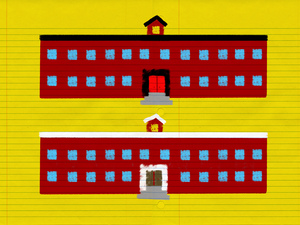
President-elect Donald J. Trump said on the campaign trail that school choice is "the new civil rights issue of our time." But talk of school choice is, at best, confusing.
AUDIE CORNISH, HOST:
Before the election, candidate Trump called school choice the new civil rights issue of our time, and his signature education proposal is a $20 billion school voucher plan. Again, traditional vouchers let parents use public money to pay for private schools, including religious schools. Now, for more on this, I'm joined by another member of the NPR Ed team, Cory Turner. Welcome to the studio.
CORY TURNER, BYLINE: Thanks, Audie.
CORNISH: So Cory, we just heard a lot from Eric about charter schools in Michigan but less about vouchers in part because Michigan doesn't allow for them. But vouchers are central to Trump's plan. So who has them, and how do they work?
TURNER: Yeah, so they're in about 14 states plus Washington, D.C. - traditional voucher programs. Wisconsin really pioneered the idea in 1990, starting in Milwaukee. We've seen them in lots of other states - Florida, Ohio, Indiana. I think the most important thing to keep in mind is that generally these vouchers are limited to students in certain categories - first and foremost low-income students, sometimes students who are zoned to a failing public school and also students with disabilities.
There's one interesting exception in Indiana, which also has one of the largest statewide voucher programs in the country. It's got about 34,000 students. Indiana has slowly been broadening access to its program beyond low-income kids to include some middle-class students. Although I should say that the higher their parents' income, the less money they get from the state.
CORNISH: Now, I mentioned that quote from Donald Trump calling school choice the new civil rights issue of our time. Help us understand that terminology.
TURNER: Yeah, so vouchers really took off as a big city movement, a conservative idea that crossed political lines because many African-American and Latino families who were really frustrated with their failing neighborhood schools - they liked the idea. That said, traditional civil rights allies like teachers' unions don't like them. They say they drain money from the public school system and that often vouchers don't really cover the full cost of private school tuition, which means that it's really not choice for a lot of low-income kids.
The research on vouchers is really hotly debated. There's one 2007 overview of voucher research that found some positive results for African-American students. But there are also a lot of important caveats in that research. A more recent review from 2011 found voucher students doing roughly the same as public school kids, really no better. And some of the newest research frankly - we heard a little bit of it in Eric's piece there - out of Louisiana and Ohio both found some negative academic effects for voucher students.
CORNISH: So what might be some of the obstacles to a national school voucher program?
TURNER: There are actually several big ones, Audie. First in 2002, the U.S. Supreme Court ruled that vouchers are constitutional, but a majority of states still have what are called Blaine Amendments which prohibit them from using state money to fund religious schools.
There are a few other obstacles. The price tag on Donald Trump's plan is roughly $20 billion. It is not clear where that money would come from. Also, it seems like to get this done, they would have to crack open the very big federal education law that Congress passed last year and took a long time to come to agreement on. And I'm not sure that Congress is in the mood to do that.
But maybe most important of all really is that vouchers are not universally popular even among conservative voters. They may make a certain amount of sense in a large school district or a city where there are enough students to support multiple choices. But if you think about it, in a lot of small towns - we've seen this on the Ed desk. In much of rural America, schools are closing or consolidating. There just aren't enough students to support choice. And for parents who live in these places, vouchers just seem like an abstract concept.
CORNISH: That's Cory Turner of the NPR Ed team. Thanks so much.
TURNER: Thank you, Audie.
Copyright © 2016 NPR. All rights reserved. Visit our website terms of use and permissions pages at www.npr.org for further information.
NPR transcripts are created on a rush deadline by Verb8tm, Inc., an NPR contractor, and produced using a proprietary transcription process developed with NPR. This text may not be in its final form and may be updated or revised in the future. Accuracy and availability may vary. The authoritative record of NPR's programming is the audio record.
9(MDAxODcyMTgzMDEyMTgxMTY5NjYxN2I4OQ004))
300x250 Ad
300x250 Ad
